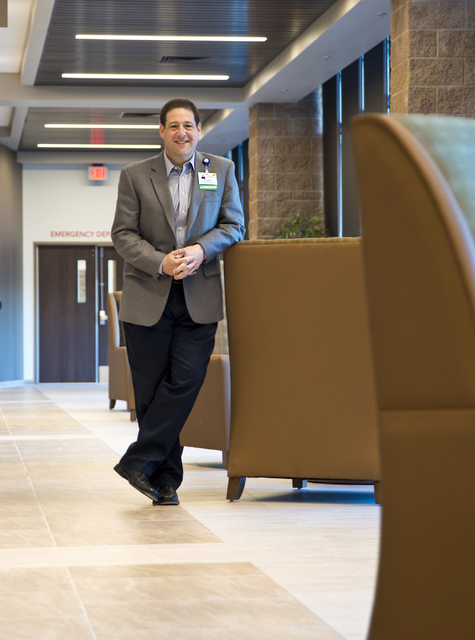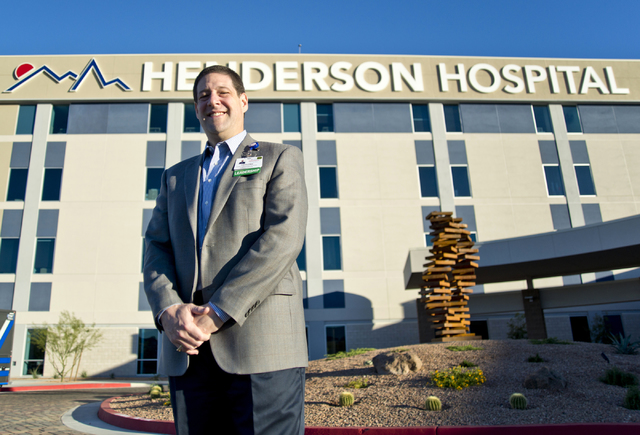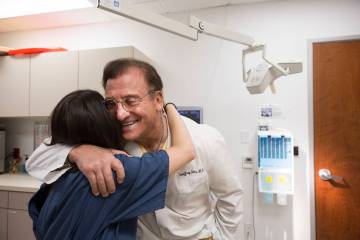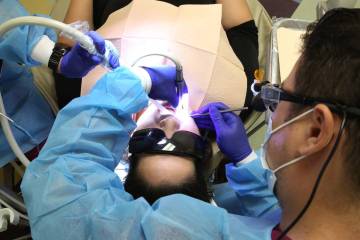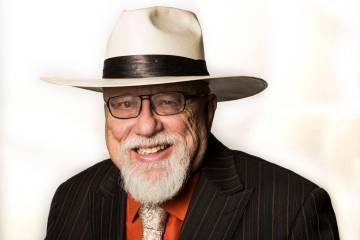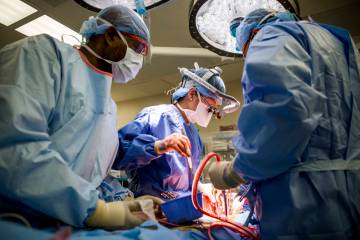Go public to keep pounds off, Henderson Hospital CEO urges
More than 15 years ago the World Health Organization recognized obesity as a global epidemic, and rates of obesity have been increasing ever since.
Currently considered a severe health hazard, obesity is a risk factor for diabetes mellitus, hypertension, abnormal lipid levels, heart failure and other related disorders.
Today, bariatric procedures, when compared with nonsurgical interventions, are recognized as the most effective strategy to induce weight loss, often resulting in remission of diabetes and hypertension remission. The procedures can cost upwards of $20,000, but most are now covered by insurance.
That a hospital CEO, Sam Kaufman, who carried an unhealthy 350 pounds on a 5-foot-9-inch frame in 2013, has become the public face of successful weight reduction surgery in Las Vegas may not have surprised anyone more than Kaufman, who now weighs 222 pounds.
Unlike so many others who’ve had weight reduction surgery — researchers reported last year that 50 percent of the people who had the same surgery as Kaufman experience significant weight gain within five years — he hasn’t slipped into bad eating habits again.
CEO at both Desert Springs and Valley Hospitals in 2013, Kaufman believed he had tried every diet and exercise weight-loss program known to man.
He came to realize that if he wanted to see his children and grandchildren grow up, he needed to try weight-loss surgery.
Before the procedure, he had planned to do what most people do — let family and a few friends know he was having a weight-loss procedure and then get on with what he hoped would be a healthier business and private life.
But not long after Kaufman recovered from a gastric sleeve procedure in which about 85 percent of his stomach was removed, Gretchen Papez, director of public relations for the Valley Health System, asked him if she could use his experience to highlight the bariatric program at Desert Springs.
He said he’d think about it.
Never had he thought about letting strangers know that his three meals a day had come to consist of 4 ounces of food or drink.
But the more the thought about it, the more he realized he should go public.
“I realized I could help some people,” he said Monday.
And he did.
After the Valley Health System built an entire TV and magazine marketing program around his experience, people, including the clinical manager of an ambulance company, said he gave them the courage to do something about their weight problems.
What is intriguing is that Kaufman, now the CEO of the new Henderson Hospital, said Monday that going public about having the weight-loss procedure may have helped him at least as much as it’s helped other people.
It helped give him the incentive to keep the weight off.
“The reason I agreed to go public was to help other people think about taking steps to become healthier,” he said. “But I think it also helped me stay accountable to people. Nobody wants to be a role model for something and then fail.”
Kaufman now believes the more public people are about wanting to become healthier, the less likely they are to slip into bad eating habits after having a procedure.
In effect, going public creates a positive pressure to succeed.
“Too many people act ashamed of trying to become healthy,” Kaufman said. “They shouldn’t try to hide it.”
Dr. James Atkinson, one of the two bariatric physicians that performed the 38-minute gastric sleeve procedure on Kaufman at Desert Springs Hospital, said that it makes sense to him that accountability to people gives a patient one more reason to stick to a healthy diet and exercise. But he added there is, as of yet, no scientific evidence to support the theory.
“What we do know,” he said, “is that no weight-loss program can completely stop a person from gaining weight if he’s intent on it. Instead of eating three small meals each day, he’ll eat several.”
A study released last year in Israel on gastric sleeve surgery reported that researchers found that excess weight loss was at 77 percent after a year, but it decreased to 56 percent after five years.
There could be no doubt that people were eating in a way to beat the surgery.
Diabetes remission was successful at 51 percent after a year, but only 20 percent after five years.
Kaufman believes the more public people are about having the surgery, the less likely they are to gain the weight back:
“I don’t know anybody who likes to fail in front of people they know and respect.”
Paul Harasim’s column runs Sunday, Tuesday and Friday in the Nevada section and Monday in the Life section. Contact him at pharasim@reviewjournal.com or 702-387-5273. Follow @paulharasim on Twitter.




